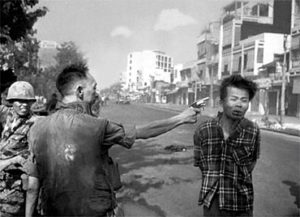I remain utterly transfixed by the Ken Burns-Lynn Novick documentary series “The Vietnam War.”
It contains some of the most compelling television I’ve ever witnessed and I am so proud of PBS for its longstanding commitment to this type of educational broadcasting.
Having tossed out that bouquet, I want to offer this barb at what I witnessed tonight.
The series tonight focused on the Tet Offensive, which the Viet Cong and the North Vietnamese launched against dozens of South Vietnamese cities on Jan. 31, 1968. “The Vietnam War” rightly points out that Tet likely was the political turning point, the singular event that turned American public opinion solidly against that bloody conflict.
Tet also produced what arguably was the most singularly graphic moment in that war. It was the photo of Gen. Nguyen Ngoc Loan’s summary execution of a Viet Cong suspect.
Loan was head of South Vietnam’s police department when he found the suspect and shot him dead on a Saigon street. The picture would earn a Pulitzer Prize for Associated Press photographer Eddie Adams. It also would deliver a lifetime of misery for Gen. Loan, who was vilified because reporting of the incident at the time failed to the tell the whole story.
I wish the Burns-Novick documentary would have told us tonight about the media’s role in demonizing Loan.
You see, Loan shot the man dead because the suspect had been part of a VC hit squad that killed a colleague of the general — and his wife and six children. Loan knew about what had happened to his friend and his family. His men arrested the suspect. Loan ordered one of his officers to shoot the suspect; the officer balked.
So, Loan took out his pistol and shot the man in the head.
Nguyen Ngoc Loan had snapped. He proved to be a human being subject to human emotion,
“The Vietnam War” didn’t tell the whole story tonight, nor did it explain why — because of the lack of full reporting in the moment — that picture came to symbolize the absolute horror of war.
However, by golly, I am going to watch the rest of this utterly spell-binding television event.
I am hooked.

K Burns is a documentary film-maker, not a scholar or professor of history. Gaps like this one underscore the importance of understanding that he’s essentially publishing his point of view in film form; his failure to explain the context of the photo suggests that he either doesn’t know the larger story (most people don’t) or does know, and decided not to include that explanation. Both are failures of a sort, but the latter is more telling, as well as more editorial.
Burns doesn’t need to be a scholar or a history professor. I am sure you understand that the photo required some context. A documentary filmmaker such as Burns, who does a superb job, should understand that requirement. Burns and Novick fell short in that effort while re-telling that horrific chapter in the Vietnam War saga.
I remember the daily death tallies on the Huntley/Brinkley report. Even then I wondered how we, and the Vietnamese, could lose so many soldiers.
Indeed the summary execution of a Viet Cong terrorist/ assassin is horrific and to the extent there is a background story that might explain why the executioner pulled the trigger and blew the suspect’s brains out surely cannot justify such conduct. But it would have been important to learn the facts and the background.
For me, an even greater horror ( should there be a need iin characterizing any horror with a superlative) was the fact that then Presidential candidate Nixon communicated with the then South Vietnamese government encouraging them to delay their participation in peace negotiations with representatives from the North. This was to avoid a perceived disadvantage to Nixon’s campaign that might have or could possibly have boosted Hubert Humphrey’s chances in the forthcoming election. The South acceded to Nixon’s request. Isn’t that treason?
It was then also revealed by Burns/ Novak that Nixon later lied about it in what we now hear in a taped conversation between Tricky Dick and Johnson. Should we be surprised? No…not hardly. But again the horror is that even in that period of orchestrated delay the war senselessly dragged on…..lives continued to be lost and it was inexcusable and treasonous conduct to create such a delay .
I too am transfixed by this PBS series. It is for me the most excellent television I have ever experienced.